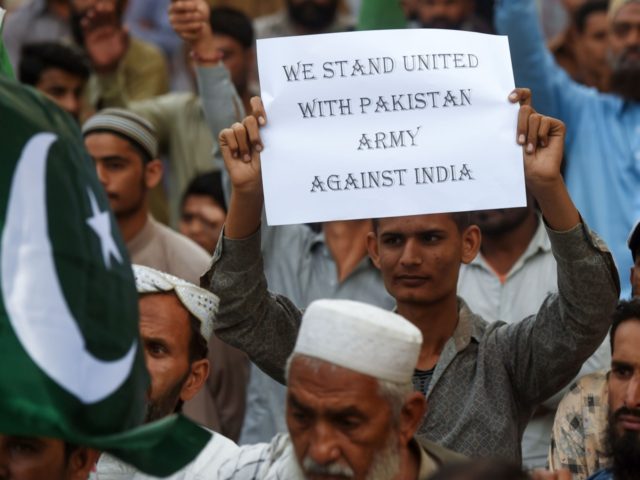WASHINGTON, DC — Pakistan’s ambassador to the United States Asad Khan on Wednesday warned that the most-serious clashes in decades between nuclear-armed neighbors and regional rivals New Delhi and Islamabad in the disputed Muslim-majority region of Kashmir could escalate further, telling Breitbart News, “We don’t want to have war,” but will strike back if necessary.
“We don’t want to have war. The prime minister has time and time again encouraged India to come and have dialogue, and that’s precisely because miscalculations can result in bad consequences that India and Pakistan cannot control,” Amb. Khan told Breitbart News after a press briefing at the Pakistani embassy. “I hope we’re not there and that we don’t have a war in South Asia.”
The ambassador told reporters the situation is in Kashmir — a region claimed by Pakistan, its ally China, and their rival India — is “very fluid,” adding, “It’s a very serious situation, and any further escalation can be dangerous.”
Although a border known as the line of control (LOC) separates the regions respectively held by India and Pakistan, both countries claim ownership of the entire Kashmir region.
The ambassador’s comments came after Pakistani Prime Minister Imran Khan delivered a televised speech on Wednesday claiming that Pakistan shot two Indian aircraft in Kashmir in retaliating to what he described as New Delhi’s aggression, referring to India’s airstrikes on allegedly Islamabad-linked terrorists in the Pakistan-administered Kashmir region on Tuesday. India’s response marked the first time India dropped bombs in Pakistan-held Kashmir in decades.
On Thursday, PM Khan pledged his country would release a captured Indian warplane pilot the following day as a “goodwill gesture” to help defuse the most-serious confrontation in two decades between the nuclear-armed neighbors over the disputed region of Kashmir.
New Delhi argues its airstrikes on Tuesday came in response to a February 14 attack that killed more than 40 security forces in India-administered Kashmir. India alleges that the Jaish-e-Mohammad (JeM) terrorist attacked with Pakistan’s blessing, an accusation denied by Islamabad.
“They are the ones who actually started,” Khan told reporters, referring to India. “They came in. They went into our territory. They dropped bombs on our side, and this happened for the first time since 1975.”
He acknowledged that despite a 2003 ceasefire between India and Pakistan, there have been repeated deadly skirmishes between the two countries along the line of control.
“They would fire from their side and we would fire from our side. This is the so-called ‘new normal’ and we don’t want it to be the new normal,” he said.
However, echoing PM Khan’s speech, he added, “If you can come in. We can also come in. If you want to hit. We can also hit.”
In his speech announcing Pakistan’s “forced” military response on Wednesday to the Indian airstrikes that allegedly killed civilians, PM Khan declared, “We just wanted to tell India that we have the capability that if you can enter our country, we can also enter your country and take action. This was our only cause.”
Referring to what will happen next, PM Khan said, echoing Amb. Khan’s comments to Breitbart News:
My question to the Indian government is — with the weapons that you have and we have, can we afford a miscalculation? Shouldn’t we think about what will happen if the situation escalates? This will not be in my control or in [Indian PM Narendra] Modi’s control.
He went on to urge Modi to engage in dialogue with Pakistan “over terrorism, we are ready.”
Islamabad denies any affiliation to the JEM terrorist group or any others. Amb. Khan maintained that no Islamic terrorist organizations operate on Pakistani soil despite allegations by Afghanistan, India, and the United States to the contrary.
“I can assure you there’s no organized presence of any group that gets the support of the state of Pakistan,” the ambassador claimed.
U.S. President Donald Trump’s administration has suspended billions of dollars in aid to Pakistan over Islamabad’s reluctance to take decisive action against terrorist groups on its soil.
Earlier this year, U.S. military and intelligence officials told lawmakers Pakistan continues to harbor terrorist groups.
“We have taken action. The point is that it is really very hard to for” Pakistan “to distinguish” between terrorists and non-terrorists,” Amb. Khan argued.
“We have been taking action, and we will continue to take more action,” he stressed.
China tends to stay in the shadows of the Kashmir dispute between Pakistan and India, usually backing Islamabad’s position.
Beijing has urged restraint by India and Pakistan in response to the latest escalation of tensions in Kashmir.
While India accuses Pakistan of backing Islamic terrorists in Kashmir, Islamabad blames New Delhi of violently oppressing pro-Pakistan separatists who are fighting for independence or in favor of a merger with Pakistan.
India and Pakistan have gone to war three times already over Kashmir.
Over 500 fatalities in Indian-administered Kashmir last year reportedly made 2018 the deadliest year in Kashmir in almost a decade.
Amb. Khan attributed the rise in tensions in recent months to “terror and repression” at the hands of India.

COMMENTS
Please let us know if you're having issues with commenting.